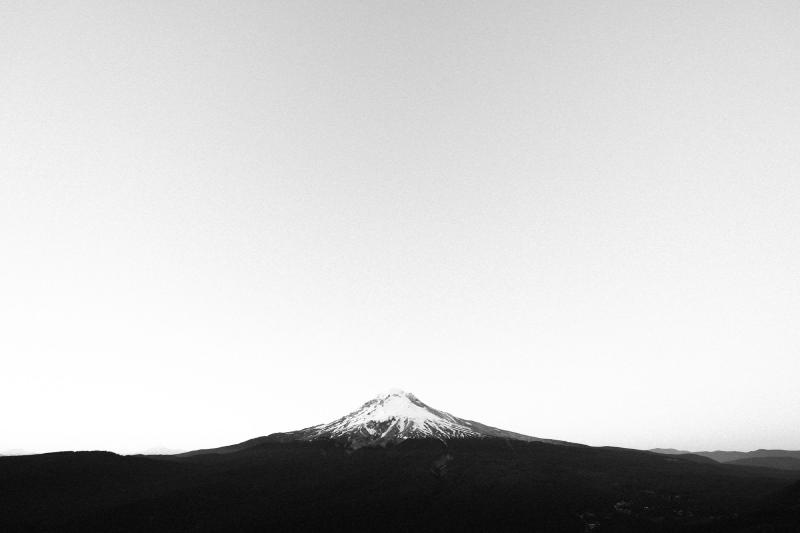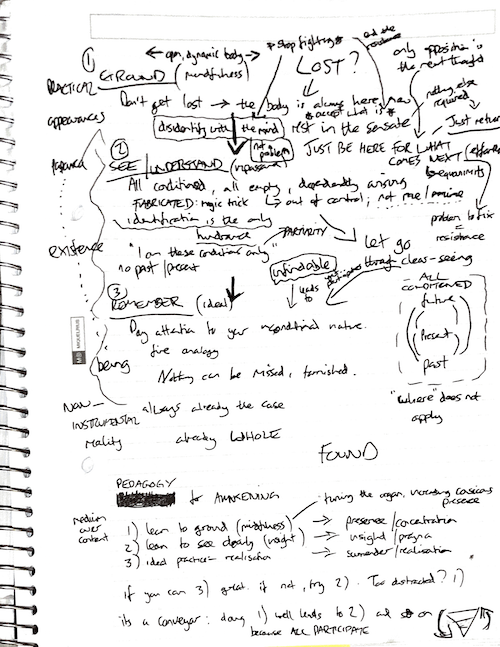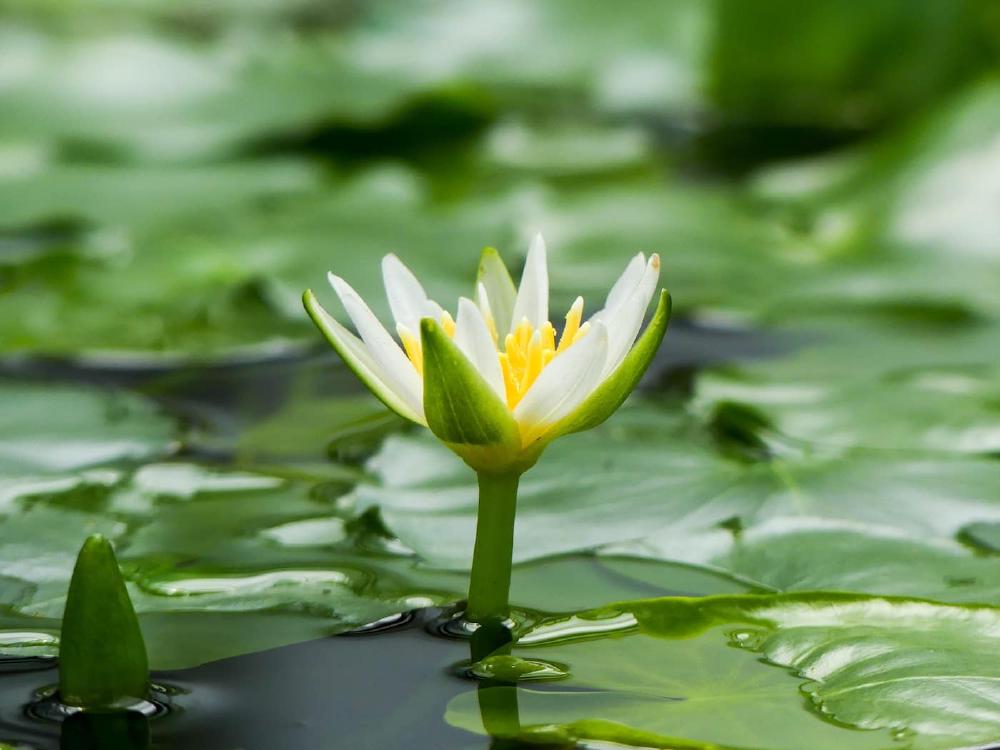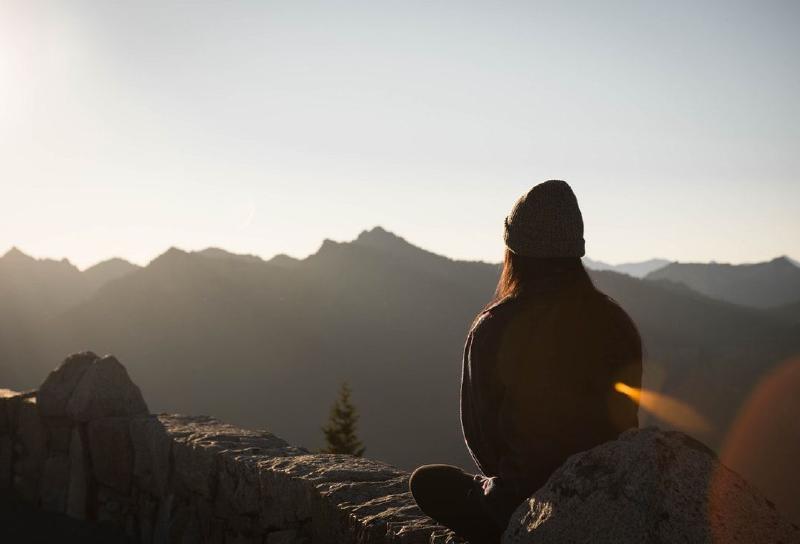Meditation
Revelation and reverence
Meditation can be boiled down to two things: revelation and reverence.
Revelation is not a divine intervention. It’s something much simpler: when we sit still, everything is freely revealed to us. If you shut your eyes now, sights, sounds, thoughts, suffering, peace and irritation all continue to arise.
Revelation means to lay bare or unveil: reality is continually disclosing itself, overflowing from moment to moment without interruption. What’s more, this takes no effort on your part. You couldn’t stop it if you tried.
Full-contact living
I have spent my life constructing a big picture in my head.
This picture was born in a struggle to understand myself and the world. Or perhaps, more candidly, to find a better way to engage with a world that felt overwhelming and intrusive (hello fellow 5s 👋).
This picture was not just written in words or captured in ideas; it was shaped through experience and tended to through practice. It’s a living view—something enacted, not just understood.
I can’t stop staring at my hand
In his talk, Already Free, Adyashanti highlights the way we fixate through an amusing example.
It’s like you got mesmerised by the movement of one of your hands in front of your face. And now you can’t stop following it wherever it goes.
So you go to the doctor and say, “Doc, I’m confined to my hand! It’s hard to see anything else and I’m tired of having to follow it around.”
Everything we think of as self is made up of not-self
Look again.
The body breathes and the heart beats without your input.
You think your thoughts are private—yet every word is borrowed from a common tongue, inherited from others.
You feel your feelings—but they arise unbidden, in shapes we all seem to share.
Your senses reach outward, but what they show you is what’s outside of you.
You believe in a solid self, a “me” at the helm—but look for it directly, and it slips through your fingers. What you find is a rotating cast, not a lone actor.
Name the narratives out loud
Whilst on retreat, I read Pema Chödrön’s Living Beautifully. In it, she outlines a practice that I’ve called interrupting the narrative.
Each time you notice yourself providing commentary or narrating your experience, interrupt the flow. Stop mid-sentence and notice what’s going on around you, in the senses. See how parts of yourself re-appear and your view widens.
This practice is direct. It quickly drops you back into a more expansive and open sense of being. It’s also accumulative: when you next narrow or narrate yourself down into something smaller, you’ll feel the visceral contraction that this requires, and perhaps think twice.
Solo retreat reflections
Here is a collection of reflections written as I left my week-long silent, solo retreat at the Hermitage:
- It’s remarkable how much time I spend telling myself what I like and dislike and then having endless hypothetical discussions with other people about those likes and dislikes.
- I’d neglected to notice the depth of this mind-wandering over the last few years, but the retreat setting brought it into clear relief. My previous philosophy had been something like “see the impermanence and emptiness of the whole show.” This was powerful, but somehow it doesn’t address rumination on the right level. Empty thoughts still proliferate.
- It’s remarkable how powerful it is to gently interrupt these internal narratives and drop back into a wide-angle, present-moment awareness. Sometimes it’s easy to overlook this space as a waiting room for the next thing. But this unremarkable middle is your open, groundless nature.
- Present moment awareness is powerful for 2 reasons: 1) it reveals incessant change, and 2) it disrupts the narratives that constantly narrow your sense of being.
- I can see more clearly how popping up into thought is often an exit strategy when there are difficult feelings (unease, stress, fear) in the chest.
- Stop watering old seeds, and the rest takes care of itself.
- It feels like 90% of my practice is returning to things as they are (and welcoming them warmly) vs any kind of “seeing through”—basically, the opposite of how I used to practice. What I notice is that when I take care of the welcoming, the realisation and revelation take care of themselves. I think TRE has been a huge help in allowing me to inhabit my body and experience more fully.
- I’m increasingly sceptical of meditative claims of attainment that mean you’ve seen something “for good” or that you’re “done” in any sense. All of this stuff has to be tended. Whatever your nature, you’re still a distractible, fallible human who is likely to try something stupid within the next 30 minutes. This retreat was transformative for me, and all of it came about through returning to simple practices with sincerity and fresh eyes.
- I hereby relinquish any and all attainment claims I’ve made in the past.
- Being best friends with myself is the alpha and omega of practice. That means welcoming the restless, tired, fearful, anxious, irritated, embarrassed and distracted selves.
- Besides the Pema-inspired practice, I was also working with shi-ne, or “remaining uninvolved.” This has a very different flavour from the Vipassana I used to practice. I noticed that I have to explicitly welcome the many strands of my experience for some time before I can authentically settle into remaining uninvolved. “Not out but through.” If I try and skip this, there tends to be all kinds of subtle denial and resistance still in play. In other words, my sense of what I’m accepting is way off. Explicitly welcoming anything uncomfortable, even if you think you’ve already done that—and seeing how the weight of your experience changes—is a powerful way of seeing where you’re still holding on.
- Notice when you’re craving The Big Stuff like Being or Stillness or Emptiness, in some abstract way. Wanting the one simple, safe step.
- Instead of reifying no-self, just notice how any apparent selfing process is discontinuous from moment to moment. Just random thoughts joining the dots post-production.
- I thought leaning into tightness would never result in spaciousness. I was wrong. I thought that what felt like 3 super-magnets lodged in my throat, forehead and crown would need to power down to experience sublime peace. I was wrong. It was my resistance to the magnetic density that kept me stuck.
- One lingering reflection: I want to get out of my own way. So much of this inner narration is meaningless, judgmental stuff that no part of me believes or wants to pursue.
- “The only opposition is the next thought” — Adyashanti, somewhere. No thought can distort or clarify the fundamental nature of this. No thought is coming to save you. This is terrifying and liberating once grasped.
- So avoid nothing and don’t buy into any thought.
Metta is sanity
I often feel bad for not having more compassion for others. I’ve done a lot of meditation, and whilst it’s helped me better relate to others and myself, I still find my default narratives crammed full of less-savoury judgements about other people.
On retreat, this was hard to ignore.
Here are some real things that crossed my mind, without having ever spoken to these people: “she’s too tall, that’s probably why society rejected her and she ended up on the Buddhist path”, “he’s too tender”, “he’s too old for dreadlocks”. Another time, I found myself explaining how a compost toilet works to an in-law, even though I don’t understand the process.
It's not all routine
There is a beautiful footpath from The Barn retreat centre to Totnes. It flanks the River Dart, undulating in and out of tree cover and bringing you nose-to-nose with the local sheep, cows and ponies.
This is my second time walking into Totnes. The first time, I came out with a steak and stilton pasty. This time, I’m off to purchase more pasties for my parents—the golden treasure from the south of the south.
Interrupt the narrative
On retreat, I’ve been reading Living Beautifully by Pema Chödrön. I’d already been inspired by several of her books, and David Chapman’s review pushed me to read this one.
The title feels almost entirely irrelevant to the content. In it, Chödrön talks about interrupting our internal narratives and returning to present-moment awareness. She chooses the word interrupt carefully—we’re neither trying to suppress the thought nor buying into its message wholesale. It’s something in between; a little nudge to bring you back to yourself.
Are meditation retreats relaxing?
Oftentimes, people associate a meditation retreat with relaxation.
This is usually my clue they’ve not been on one. It’s a fair assumption, though.
There are plenty of emotions I feel on retreat, but they tend to be on either side of the relaxing middle. There is a kind of homecoming that “relaxation” doesn’t begin to capture. And on the other side, there can be plenty of struggle and suffering.
So what happens on retreat?
Hello again, Rob
“Blessing, infinite in its modes and colours, often seems to me to be the very nature of all things, of all existence.”
—Rob Burbea, in one of his final emails
I arrived at The Barn yesterday for a 6-night solo retreat at the Hermitage. Walking along one of the garden trails, one of the coordinators asked when I was last on retreat.
“It must have been 10 years ago, at least”, I said, surprising myself. Had it been that long?
On retreat
Today, I’m headed off on a silent meditation retreat for a week.
No news
No phone
No internet
No scrolling
No ChatGPT
No podcasts
No electricity
No light conversation
No popping to the shops
No AirPod Pro 2s with active noise cancellation
Just a journal, a pen and a cushion.
I originally planned to queue up 7 days of writing in advance of going away. I have since decided that’s ludicrous and not worth the effort.
Meditators have a warped view of acceptance
I sat against the wall feeling overwhelmed.
”Is there a part of your body that feels ok right now?” asked Susan, holding gentle eye contact.
I struggled through the fear and sadness in my chest to find somewhere safe.
“My hips”, I said.
“Ok, let your awareness sink into your hips”, she replied.
“I feel better, but it’s still painful up here,” I said, gesturing to my chest.
“Just hold the awareness down there a little longer”, she said.
Acceptance is what we call clarity as it dawns in a person
Acceptance is your most potent ally in meditation. It’s not a beginner’s experience on the way to something better. It still shows up to teach me every day, after 18 years of practice.
Acceptance is not a slide into passivity. Instead, we see how we’re already actively resisting parts of our experience—pushing away nagging thoughts, clenching against unpleasant emotions.
Acceptance is the dawning realisation that we can let go of that struggle without the world imploding. We can even lean into it—noticing, as Mark Manson put it, that facing the negative is a positive experience.
Orientations
I have meditated and written down my reflections for nearly 15 years. Some of the most useful scribblings have been the pointers I’ve left myself—my orientations to the highest truths, or what Rob Burbea called “ways of seeing that free.”
Contemplation often brings profound yet tantalising insights. One moment it all makes sense, and the next day you feel robbed. Yet, certain words and phrases can “bind” the insight and deliver us back to the understanding. The process of putting words to these experiences is often downplayed, with some justification: it’s easy to reify our insights and so divorce ourselves from what is actually happening now. But the power of the right words offered in the right mindset is not dissimilar to an incantation, and we must practice wisdom for it remain alive.
Logos
Coming soon to a psyche near you.
Less but clearer: coming back to simplicity in meditation

Despite the minimal instructions for meditation—sit still and pay attention—it somehow becomes much more: watching for this, avoiding that, practising this technique, taking that attitude. A new avenue of self-improvement.
Each of these attitudes comes with its own expectations that can drag us away from the core directive of meditation: doing less but seeing things more clearly.
The idea of “less but clearer” was something I recently came across again in Pema Chodron’s poignant When Things Fall Apart: Heart Advice for Difficult Times, which I highly recommend if you’re struggling with any kind of upheaval in your life.
The 3 stages of Insight Meditation
A few days ago, I found myself on the train and full of coffee. I did what I often do and started doodling: about meditation, awakening and how I would teach the progress of insight to others.
This resulted in 30 minutes of furious scribbling that I’d thought I’d share and explain a little.

In short, there are three waypoints on the journey:
- Learning to ground
- Learning to see clearly
- Just sitting
1) Learning to ground
Learning to ground relates to what we generally call mindfulness. It is a way of engaging with appearances (the content of your mind), accepting them and building your ability to concentrate. It’s a practical way of cultivating conscious presence.
Just come back
Meditation can be summed up in one directive: just come back.
When we first learn to follow the breath, the instruction is simple:
- Pay attention to the sensations of the breath.
- When you get lost or distracted, just come back.

People naturally tend to judge their success by the amount of time they can consistently follow the breath.
Staying with the breath seems like a win, and too often the instruction to “come back” is seen as a mere stepping stone back to the real work of meditation.
Why meditation matters

Meditation continues to soar in popularity.
From the ever-expanding body of scientific research to the numbers of prominent leaders professing to practice meditation, we are living through a contemplative renaissance.
Your Mum might have even got a Zen colouring book for Christmas.
In an age of distraction and shallowness, the simplicity and stillness promised by meditation draw more and more people into its centre of gravity.
Apps like Headspace and Calm have opened up the basics of meditation to millions of newcomers, providing bite-sized guided meditations to help people relax and de-stress. If people stick with it long enough, they find themselves on a deeper journey, and often a completely new way of approaching life.
Meditation reading recommendations
2021 note: I often get asked for recommendations on meditation books and teachers. This was my response around 2014! There are still some great books and websites listed, so I’ve kept it around.
I started meditating when I was 22, a couple of years after taking an interest in Taoism. Not long after beginning my practice I came across Daniel Ingram’s Mastering the Core Teachings of the Buddha. I was very impressed with the openness and clarity of the book, and immediately dedicated myself to Vipassana meditation as outlined in the first few chapters. It didn’t take long before I stumbled across the first of many events that have convinced me that this kind of mind training is something truly invaluable and deeply empowering. I wrote more about my meeting with meditation in Answering the Demand.
7 reasons to start a meditation journal
2021 note: this post was written 7 years ago, when I was the founder of a meditation community known as OpenSit. Times have changed and OpenSit is no longer online. If you’re looking for some way of starting up a meditation journal today, many meditation apps have some journalling functionality built in. Failing that, any paper pad will do!
So you’re already sold on meditation right?
You read all those convincing studies. Your own personal experience has been resoundingly positive. And you saw those pictures on the Internet of beautiful yoginis basking in effortless full-lotus serenity next to waterfalls, beaches and other scenes of outstanding natural beauty.
Meditation on the breath
To see to the bottom of a pond, the water needs to be clear and still. The same applies to your mind. Until the mind is stilled, it defaults to stirring up debris in the form of stories, doubts and endless self-narrative. This debris clouds your experience, distorting the true nature of your mind.
By focusing on the breath, we give the mind something to fully apply itself to. With the mind focused and absorbed in the breath the debris settles, our clarity increases, and our experience becomes still. Clarity and stillness are the prime conditions for insight.
What is meditation?
Meditation is the practice of freedom through insight
Through the practise of paying attention to our moment-to-moment experience, we gain insight through seeing how we are not free. Each moment of awakeness helps us understand how we create friction in our experience by resisting it, and how this habitual resistance is stressful and draining.
Furthermore, by learning to recognise the primary characteristics of our experience, we notice our ignorance about the nature of things – bestowing ‘mind’, ‘world’ and ‘self’ with a solidity and essence where none can be found.
Because we care
Because we care, we choose to practice.
We yearn for peace, for genuine happiness. And so we come to the cushion and engage with the crux of our predicament: what does it mean to be here?
The feeling of being here is the gateway to all life’s vicissitudes, from the ever-shifting sensory landscape around us to our personal thoughts and emotions. It all arises right here.
We often neglect the fullness of presence in favour of a reliance on thought. But thought is only one small part of being here, and it tends to ride on the back of a lot of unconscious emotional conditioning that we pick up through parents, culture and complete accident.
The self is always implied, never experienced
When you sit down to practice Vipassana meditation, you observe your moment to moment experience with the intention of seeing the three characteristics: anicca (impermanence, change), dukkha (unsatisfactoriness, suffering) and anatta (not-self).
More accurately, you are tuning into the 3Cs, as they are always already the case. This is not a philosophical exercise – the practice is to stay at the immediate sensate level of your experience, with a degree of mental calm that allows you to observe manifesting reality without getting caught up in it.
Three-week meditation work retreat at Gaia House
On Sunday night I got back from a three week work retreat at the stunning Gaia House in Devon.
A month or so back I’d been looking for a job, and also wanting to go on retreat, so I decided that I could wallop two birds with one stone, whilst also lending a helping hand at a world-renowned retreat centre.
According to the Progress of Insight map which I’d found very useful since I started meditating, I’d been lurking in the equanimity phase of my first insight cycle since my first retreat in January. I’d experienced formations, tasted the formless realms, but now just seemed to be going round in circles. To make matters slightly more uncomfortable I’d also slipped back in the dukkha nanas a few times. Not fun, and a powerful incentive to go on retreat.
10 day Vipassana meditation retreat at Dhamma Dipa
I’ve been back from Dhamma Dipa for two days now. Here is a report of how it worked out for me, for those interested.
The first 3 days were hell, and I don’t use the term lightly. Physical pain, mental judgements and overwhelming emotional attachments all quickly came to the surface thanks to prolonged meditation and the Noble Silence. The whole retreat experience is set-up so as to facilitate this kind of coming-to-terms: there’s no-one to speak to, nothing to distract yourself with. You just sit there in your own self-created misery, until you learn how to understand and work with it. All those fears, aversions, cravings, judgements, negativities are out in the open, and you can do little but sit back and watch them push and pull you around.